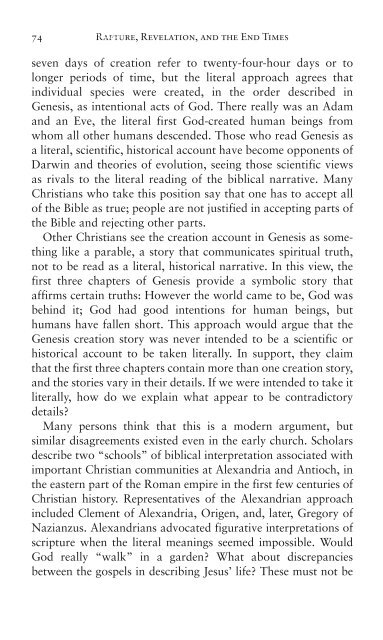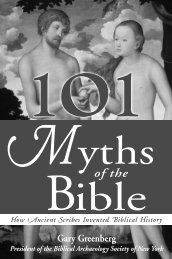Rapture, Revelation, and the End Times - Conscious Evolution TV
Rapture, Revelation, and the End Times - Conscious Evolution TV
Rapture, Revelation, and the End Times - Conscious Evolution TV
Create successful ePaper yourself
Turn your PDF publications into a flip-book with our unique Google optimized e-Paper software.
74robin-bobin <strong>Rapture</strong>, <strong>Revelation</strong>, <strong>and</strong> <strong>the</strong> <strong>End</strong> <strong>Times</strong>seven days of creation refer to twenty-four-hour days or tolonger periods of time, but <strong>the</strong> literal approach agrees thatindividual species were created, in <strong>the</strong> order described inGenesis, as intentional acts of God. There really was an Adam<strong>and</strong> an Eve, <strong>the</strong> literal first God-created human beings fromwhom all o<strong>the</strong>r humans descended. Those who read Genesis asa literal, scientific, historical account have become opponents ofDarwin <strong>and</strong> <strong>the</strong>ories of evolution, seeing those scientific viewsas rivals to <strong>the</strong> literal reading of <strong>the</strong> biblical narrative. ManyChristians who take this position say that one has to accept allof <strong>the</strong> Bible as true; people are not justified in accepting parts of<strong>the</strong> Bible <strong>and</strong> rejecting o<strong>the</strong>r parts.O<strong>the</strong>r Christians see <strong>the</strong> creation account in Genesis as somethinglike a parable, a story that communicates spiritual truth,not to be read as a literal, historical narrative. In this view, <strong>the</strong>first three chapters of Genesis provide a symbolic story thataffirms certain truths: However <strong>the</strong> world came to be, God wasbehind it; God had good intentions for human beings, buthumans have fallen short. This approach would argue that <strong>the</strong>Genesis creation story was never intended to be a scientific orhistorical account to be taken literally. In support, <strong>the</strong>y claimthat <strong>the</strong> first three chapters contain more than one creation story,<strong>and</strong> <strong>the</strong> stories vary in <strong>the</strong>ir details. If we were intended to take itliterally, how do we explain what appear to be contradictorydetails?Many persons think that this is a modern argument, butsimilar disagreements existed even in <strong>the</strong> early church. Scholarsdescribe two “schools” of biblical interpretation associated withimportant Christian communities at Alex<strong>and</strong>ria <strong>and</strong> Antioch, in<strong>the</strong> eastern part of <strong>the</strong> Roman empire in <strong>the</strong> first few centuries ofChristian history. Representatives of <strong>the</strong> Alex<strong>and</strong>rian approachincluded Clement of Alex<strong>and</strong>ria, Origen, <strong>and</strong>, later, Gregory ofNazianzus. Alex<strong>and</strong>rians advocated figurative interpretations ofscripture when <strong>the</strong> literal meanings seemed impossible. WouldGod really “walk” in a garden? What about discrepanciesbetween <strong>the</strong> gospels in describing Jesus’ life? These must not berobin-bobin





